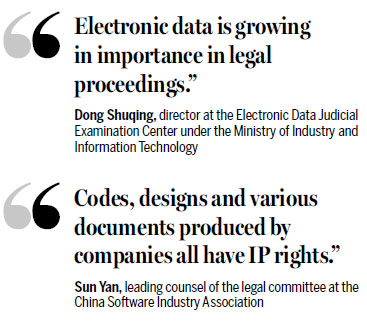Time for usable copyright technology, say experts
Industry insiders and lawyers endorsed the use of the trusted timestamping technology to protect copyrights in the internet age at a recent forum.
"With the increasing popularity of the internet, electronic data is growing in importance in legal proceedings," said Dong Shuqing, director at the Electronic Data Judicial Examination Center under the Ministry of Industry and Information Technology, at the 2016 China Software IP Protection Forum on June 18 in Dalian, Liaoning province.
The forum is part of the 14th China International Software & Information Service Fair.
Dong said electronic data is fragile and can be modified or deleted purposely, meaning that "not all of it can be used as evidence in court".
Judicial examination is an important procedure in obtaining evidence that aims to find out if data has been copied or edited, he explained. "The trusted time-stamping technology is making the process easier."

A timestamp is an electronic certificate that keeps track of the creation and modification time of a document. However, if the timestamp comes from an unauthorized server, it will not be admissible as evidence due to the fact that it can be easily modified.
A trusted timestamp means a timestamp that is legally recognized as it is issued by a time authority, and nobody - even the owner of the document - can change it once it has been recorded.
Sun Yan, leading counsel of the legal committee at the China Software Industry Association, suggested companies immediately apply for timestamping protection when an intellectual property is created.
"Codes, designs and various documents produced by companies all have IP rights, and there are many ways to lose them, such as through the actions of disgruntled former employees, hackers and competitors," he said. "Unfortunately, as a result, many companies find themselves short of evidence when they want to legally defend their rights."
Chen Yan, vice-chairman of the Shenzhen Copyright Society, said Guangdong province leads the nation in intellectual property creation, use and management, but the biggest challenge is protection.
Shenzhen started a national pilot program in 2007 using the trusted timestamping technology in IP protection. The program has been promoted across the province as more companies start to use the technology, Chen said.
China's leading authorized image provider Visual China Group uses trusted timestamping technology to collect evidence in the fight against piracy, said the company's vice-chairman Zhang Honglin who is responsible for its copyright affairs.
"Each picture we obtain is the result of teamwork," he said. "Sometimes it takes an entire day to take one perfectly usable picture, but unauthorized downloading and use of our pictures renders these efforts worthless."
Protection, in an instant
UniTrust Time Stamp Authority is China's only trusted timestamping organization cooperating with the National Time Service Center to ensure authoritative time records.
It has issued timestamps for businesses in many sectors, including e-commerce, healthcare, document management, judicial enforcement and IP protection.
Compared with traditional notarization methods that cost at least 300 yuan ($45.50) and take a month to complete, a timestamp costs only 10 yuan and takes less than a second, said Zhang Changli, chairman of UniTrust.
"The timestamped document can be a single photo or a package of 10,000 photos. It can be a simple idea of a dozen words or a novel with a million words," he said. "A timestamp is like a birth certificate that recognizes rights at the very beginning."
zhangzhao@chinadaily.com.cn
(China Daily 06/29/2016 page17)














